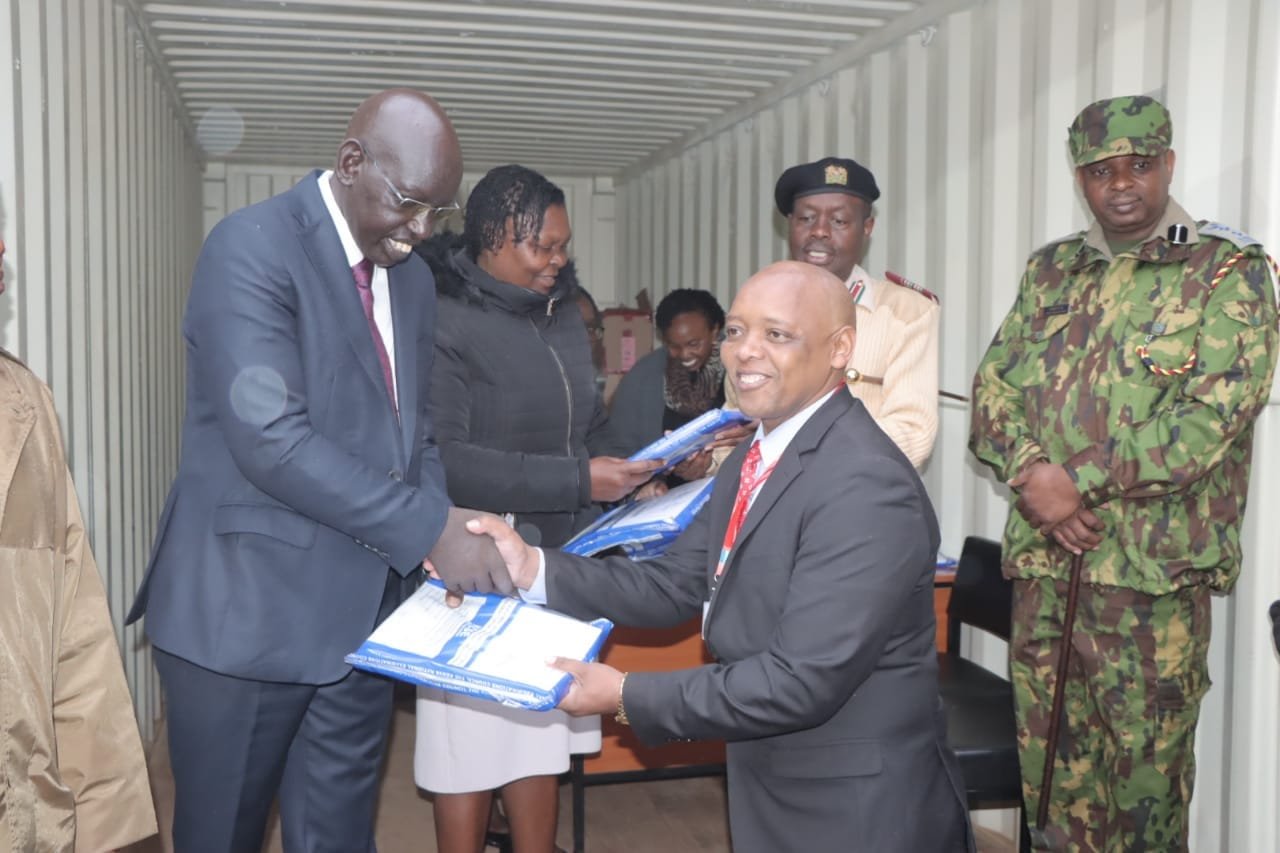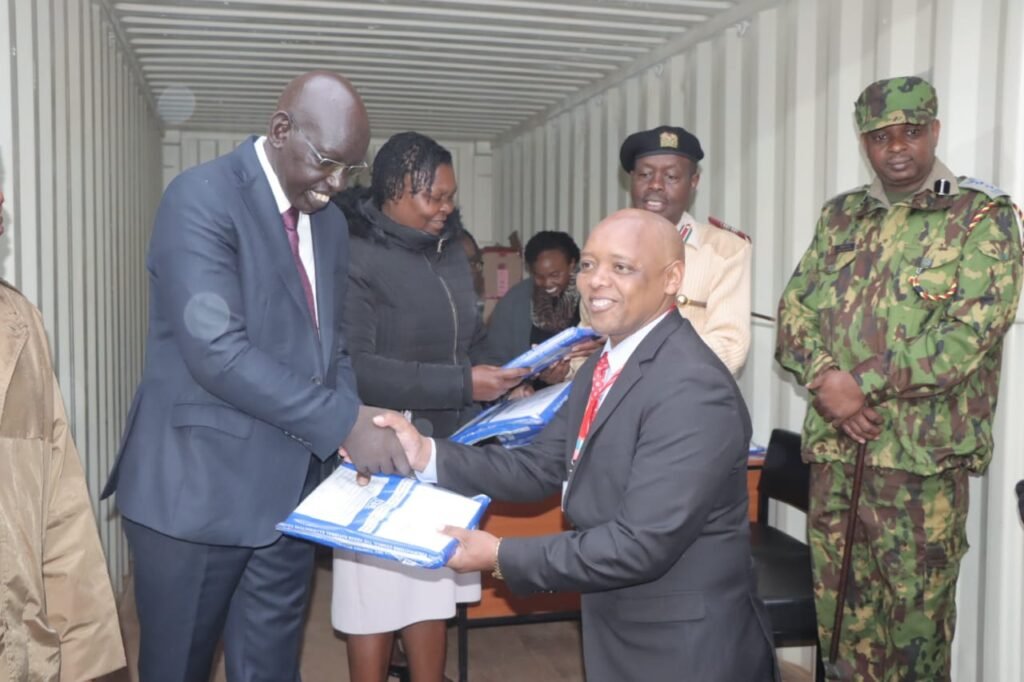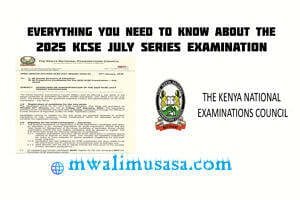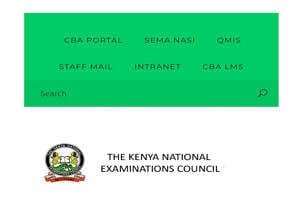How Exam Leakage is Threatening the Integrity of Kenya’s KCSE 2024


Introduction: The Pivotal Role of KCSE
The Kenya Certificate of Secondary Education (KCSE) serves as a fundamental examination within the Kenyan education system, assessing students’ competency and readiness for higher education or the job market. Conducted annually, this examination is crucial for evaluating the performance of secondary school learners, with its outcomes significantly influencing their academic trajectories and professional opportunities. Currently, the KCSE examination period is in full swing, with only six days remaining until its conclusion.
The integrity of the KCSE is central to its purpose; it not only determines individual educational paths but also reflects the quality of the national education system as a whole. However, in recent years, the rising prevalence of exam leakage has emerged as a serious concern for education stakeholders, prompting discussions around the reliability and fairness of the exam process. Reports indicate that this year has witnessed unprecedented levels of exam leakage, raising alarms about the potential erosion of trust in the KCSE as a legitimate measure of student capability.
The Role of KNEC in Conducting KCSE Exams
The Kenya National Examinations Council (KNEC) plays a critical role in managing and overseeing the Kenya Certificate of Secondary Education (KCSE) examinations. Established under the Kenya National Examinations Council Act of 2012, KNEC is tasked with the responsibility of ensuring that examinations are conducted in a fair and transparent manner, thereby protecting the integrity of the academic system. One of the key responsibilities of KNEC is the development of examination materials, which include setting, printing, and distributing examination papers.
To secure examination materials, KNEC employs a series of stringent procedures designed to minimize the possibility of leakage. The examination papers are printed under high security, with access limited to authorized personnel only. Once the papers are prepared, KNEC ensures they are stored in secure facilities until the day of the examination. On the exam day, a coordinated effort is initiated to distribute these materials to various examination centers across the country efficiently and discreetly.
Moreover, KNEC is responsible for training examination officials and invigilators who oversee the conduct of the KCSE exams. These officials are instructed on the importance of maintaining examination integrity and the ethical standards expected during the examination process. They are empowered to enforce rules and protocols that mitigate any attempts at malpractice. KNEC also carries out monitoring and evaluation of the examinations to identify and address any irregularities promptly.
In maintaining the integrity of the KCSE exams, KNEC remains committed to ensuring that every candidate is assessed fairly. This includes upholding rigorous standards for examination administration, as well as implementing measures to investigate and act against any incidents of examination misconduct. As such, KNEC’s role is vital in fostering a trustworthy examination environment that students and stakeholders can rely on.
Key Players in Exam Supervision
The supervision of the Kenya Certificate of Secondary Education (KCSE) exams is a multifaceted process involving various stakeholders who contribute significantly to maintaining the integrity and credibility of the examination. Among the primary players are teachers from the Teachers Service Commission (TSC), officials from the Ministry of Education (MoE), and law enforcement agencies, particularly police officers.
Teachers from the TSC play a pivotal role in the administration of the KCSE exams. They are responsible for preparing students for the assessments, providing guidance on examination procedures, and directly overseeing the exam process at their respective schools. Their familiarity with the examination content and protocols enables them to identify and prevent potential malpractices during the administration of exams. Moreover, they are tasked with ensuring that the examination environment is conducive to academic integrity, which includes monitoring the behavior of students and maintaining strict adherence to examination regulations.
Officials from the MoE also play an essential part in the supervision of the KCSE examinations. They are responsible for establishing policies, guidelines, and standards governing the examination process. Their role extends to training and mobilizing exam supervisors and invigilators, ensuring that they understand the expectations and protocols in place to uphold the examination’s integrity. Additionally, these officials are often involved in logistical coordination, including the distribution of examination materials to schools, which is critical in preventing unauthorized access to exam content prior to the assessment.
Furthermore, police officers assist in maintaining security during the KCSE examinations. Their presence helps deter any form of malpractice, such as cheating or examination leakage. They ensure that the examination centers are secure and intervene when necessary to uphold the law. Together, these stakeholders form a collaborative framework aimed at ensuring that the KCSE examinations are conducted smoothly, thereby preserving the value and credibility of the academic qualifications achieved by students in Kenya.
The Rising Trend of Exam Leakage
In recent years, Kenya has witnessed a concerning increase in reports of exam leakage within the Kenya Certificate of Secondary Education (KCSE) cycle. This phenomenon has alarmed educators, stakeholders, and policymakers alike, as it poses a significant threat to the credibility of the examinations and, by extension, the integrity of the national education system. Data from the Kenya National Examination Council (KNEC) indicates that instances of leaked examination materials have surged, raising questions about the security measures currently in place to protect the examination process.
The repercussions of exam leakage extend far beyond the immediate implications for academic achievement. Students who adhere to the principles of hard work and honesty find themselves competing against peers who may have accessed leaked materials, which undermines the efforts of diligent learners. This unfortunate reality can evoke a sense of injustice and frustration among students who believe in the meritocratic values of education. Moreover, the emotional toll on students is compounded as they grapple with anxiety over their performance amid such disruptions.
In addition to emotional repercussions, exam leakage also significantly erodes public trust in the education system. Concerned parents and communities cast doubts on the efficacy and fairness of the KCSE examinations, which are pivotal in determining learners’ future educational opportunities and career paths. As the integrity of the examination system is called into question, the long-term implications for educational standards in Kenya are profound. There is an urgent need for a multi-faceted approach that includes stricter security protocols, enhanced monitoring mechanisms, and comprehensive stakeholder engagement to curb the rising trend of exam leakage effectively.
Possible Factors Contributing to Exam Leakage
The recent surge in exam leakage incidents raises critical concerns regarding the integrity of Kenya’s KCSE 2024 examinations. Multiple factors contribute to this troubling phenomenon, encompassing technological advancements, systemic corruption, security vulnerabilities, and inadequate oversight in specific regions. Understanding these factors is crucial for addressing the root causes of exam leakages.
On the technological front, the proliferation of smartphones and social media platforms has created new avenues for disseminating confidential exam materials. The instantaneous nature of communication allows for rapid sharing of exam questions, exacerbating the issue. In many cases, access to the internet and related technologies has outpaced the development of corresponding security measures designed to protect exam integrity. Consequently, this technological landscape provides fertile ground for those intent on exploiting vulnerabilities for unethical gains.
Corruption within the education system is another significant factor contributing to exam leakages. Instances of bribery and collusion among various stakeholders, including educators and examination officials, underline the erosion of ethical standards in the administration of examinations. When individuals prioritize personal gain over their professional responsibilities, the sanctity of the examination process is irrevocably compromised. This undermines student efforts and casts doubt on the credibility of the KCSE results.
Additionally, security loopholes are prevalent in examination setups, further facilitating leakages. Many examination centers experience insufficient security apparatus, allowing unauthorized personnel the opportunity to manipulate or access sensitive materials. The increased demand for exams, coupled with insufficient resources allocated to secure examination processes, creates a precarious environment where integrity is constantly threatened.
Moreover, regions that lack adequate oversight often encounter challenges in managing exam materials. In such areas, the lack of trained personnel and limited resources hampers effective monitoring of exam protocols. As a result, opportunities for malpractice emerge, undermining the entire examination framework. Other systemic issues, including political interference and inadequate training for examination supervisors, also exacerbate the challenges faced in maintaining examination integrity.
Measures Taken by Authorities
The issue of exam leakage has garnered significant attention in Kenya, particularly concerning the integrity of the Kenya Certificate of Secondary Education (KCSE) examinations scheduled for 2024. In response to this pressing concern, the Kenya National Examinations Council (KNEC) has implemented several measures aimed at combating the menace. These initiatives form part of a broader strategy to ensure that the examination process remains fair and trustworthy.
One of the pivotal actions taken by KNEC involves ongoing investigations into the sources and networks responsible for disseminating leaked materials. These investigations are not only aimed at identifying individuals directly involved but also at tracing the origin of these leaks. Additionally, the council has moved swiftly to suspend personnel found to be complicit in the distribution of examination papers before their official release. Such measures signal a zero-tolerance policy towards any acts of misconduct that threaten the examination’s integrity.
Furthermore, KNEC is working closely with relevant government bodies to enforce stricter supervision during the examination process. This includes enhancing security measures at examination centers and increasing the presence of invigilators to monitor the conduct of both candidates and examination officials. The integration of technology, such as surveillance cameras and secure storage for examination materials, has also been emphasized as essential tools in preventing future leaks.
Law enforcement agencies have a crucial role in this battle against exam leakage. These agencies are actively involved in apprehending individuals engaged in the purchasing or distribution of leaked examinations. By collaborating with KNEC and educational stakeholders, law enforcement aims to dismantle the networks that perpetuate this cycle of corruption, thereby strengthening the overall integrity of the KCSE 2024 examinations.
The Role of TSC Teachers and MoE Officials
In the context of the Kenya Certificate of Secondary Education (KCSE) examinations, the Teacher Service Commission (TSC) teachers and Ministry of Education (MoE) officials play a pivotal role in ensuring the credibility and integrity of the examination process. Their responsibilities encompass various critical functions, from overseeing the administration of examinations to safeguarding the examination materials entrusted to them. TSC teachers act as the frontline personnel who interact directly with students during the examination period, while MoE officials are tasked with strategic oversight and policymaking that governs the examination framework.
However, these professionals face significant challenges that may hinder their effectiveness in upholding examination integrity. Issues such as inadequate training, limited resources, and external pressures may compromise their ability to perform their duties optimally. Moreover, the pervasive culture of academic dishonesty in some schools creates an environment where exam leakage can thrive, further complicating the responsibilities of TSC teachers and MoE officials. It is crucial for them to be equipped with robust strategies to mitigate these challenges and maintain the sanctity of the examination process.
One of the strategies that TSC teachers and MoE officials can adopt is to engage in regular integrity training, which emphasizes the importance of ethical conduct in examinations. Such training would enhance their vigilance during the examination period and promote a culture of honesty among students. Additionally, increasing collaboration between the TSC and MoE to establish clear protocols for reporting and addressing any incidences of exam leakage can improve accountability and deter malpractices. By fostering a sense of ownership and responsibility among educators, the integrity of the KCSE examination process can be effectively safeguarded, fortifying its credibility in the eyes of stakeholders.
Public Reaction and Concerns
The recent incidents of exam leakage in Kenya have evoked a strong response from various segments of society. Parents, students, and educators alike are expressing profound concern regarding the integrity and reliability of the Kenya Certificate of Secondary Education (KCSE) examinations scheduled for 2024. This widespread anxiety is rooted in the fear that these breaches not only compromise individual student performance but also tarnish the value of the educational qualifications themselves.
Parents are particularly worried about the long-term implications of the ongoing exam scandals. Many see these events as a betrayal of the trust placed in the education system, questioning whether their children’s hard work will translate into genuine qualifications or if those achievements would be diminished by unfair practices. Such skepticism is likely to foster an environment of uncertainty surrounding the validity of academic qualifications, leading to a decline in public confidence in the educational authorities tasked with overseeing examination integrity.
Students, on the other hand, are grappling with the emotional toll that this situation represents. Those who are preparing for the KCSE exams have voiced feelings of anxiety and disillusionment, as they perceive the efforts they put into their studies may be undermined by systemic failures. This sentiment creates an atmosphere where meritocracy is questioned, raising doubts about the fairness and legitimacy of the examination process.
Educators are also expressing concern, noting that if such issues persist, they could lead to a broader erosion of faith in the educational system. The potential long-term damage to reputation and trust creates a pressing need to fortify mechanisms that ensure examination security. It is clear that the ripple effects of these exam leakages extend beyond individual incidents, posing a substantial threat to the integrity of educational assessments and the commitment to upholding educational standards in Kenya.
Conclusion: The Urgency of Addressing Exam Leaks
The integrity of Kenya’s Kenya Certificate of Secondary Education (KCSE) examination is currently at a critical juncture due to the alarming rise in exam leakages. Such breaches not only compromise the assessment process but also undermine the efforts of diligent students who prepare rigorously for these pivotal examinations. To protect the value of KCSE, a robust and collaborative approach is essential, involving all stakeholders, including the Kenya National Examinations Council (KNEC), the Teachers Service Commission (TSC), and the Ministry of Education (MoE).
First and foremost, it is imperative that effective security measures be instituted to safeguard examination materials throughout the entire process, from preparation to administration. Stakeholders must work together to identify vulnerabilities within the current system and develop mitigating strategies that address them comprehensively. Furthermore, educating educators and students alike about the severe consequences of exam leakages can foster a culture of integrity and respect for the examination process.
Additionally, public awareness campaigns can be instrumental in mobilizing community support against exam-related malpractices. By creating a societal ethos that values honesty and transparency, the path towards curbing exam leakage can be strengthened. It is through collaborative efforts that a secure and fair examination environment can be established, ensuring students are assessed equitably.
Ultimately, safeguarding the integrity of the KCSE is paramount for the future academic and professional opportunities of Kenyan students. Without prompt action, the credibility of these assessments will continue to be threatened, with far-reaching implications on the country’s educational landscape. The time to act is now, as we work collectively to uphold the sanctity of our educational assessments for generations to come.







